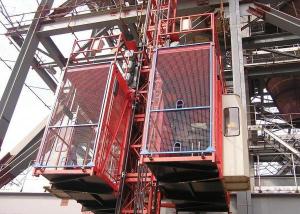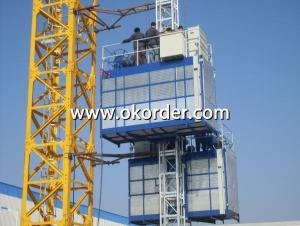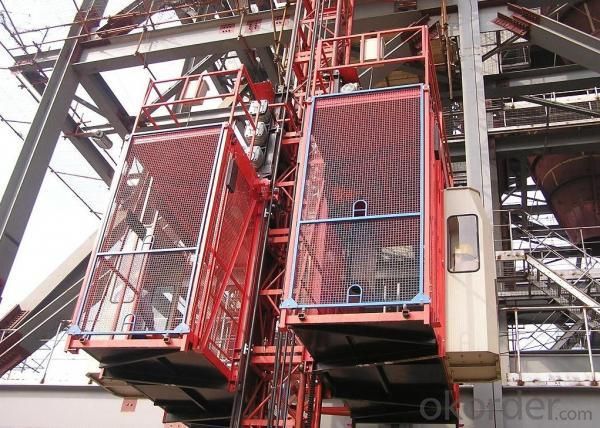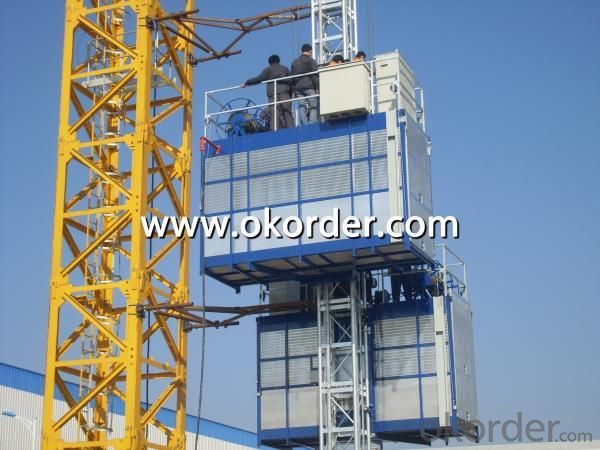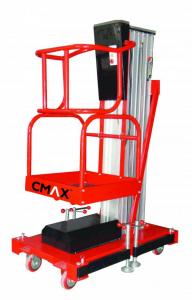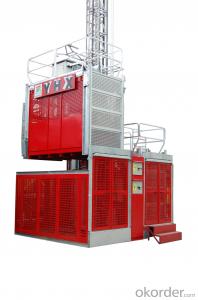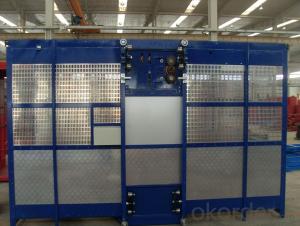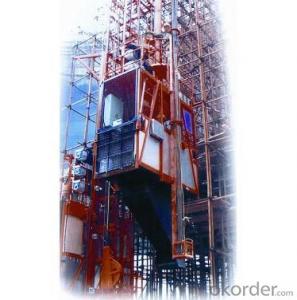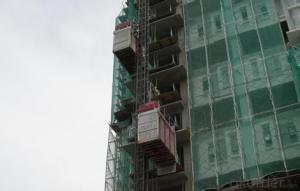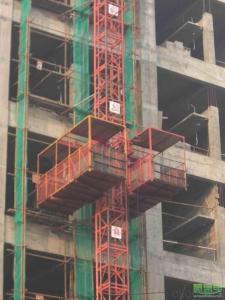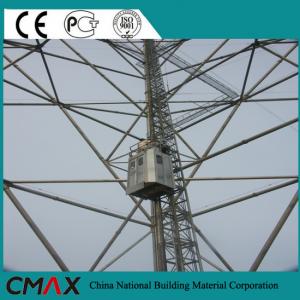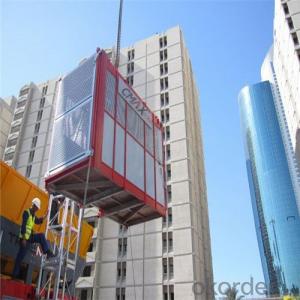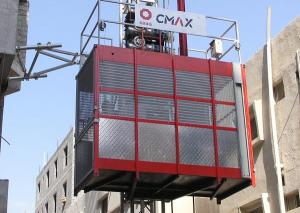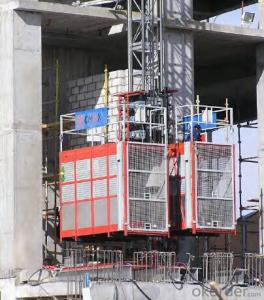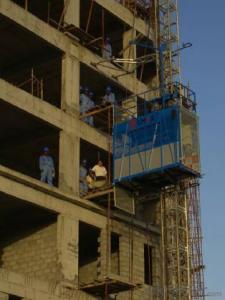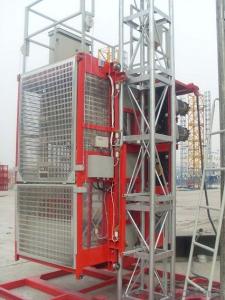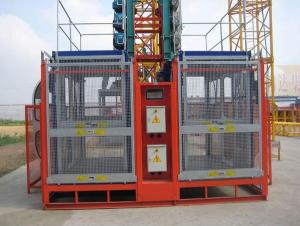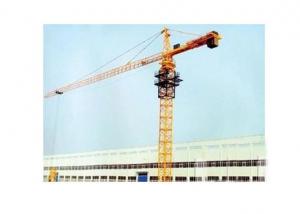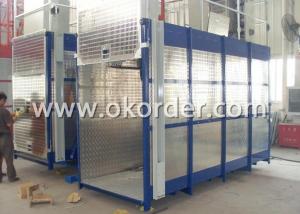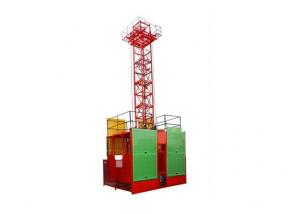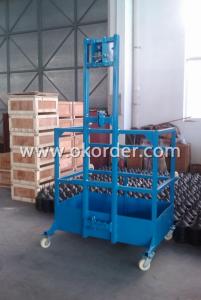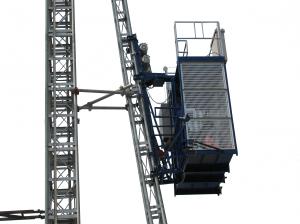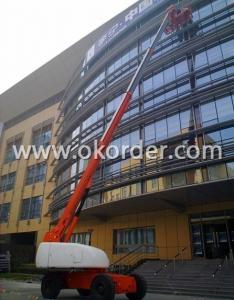Building Hoist SC120/120
- Loading Port:
- China Main Port
- Payment Terms:
- TT or L/C
- Min Order Qty:
- 1 Set set
- Supply Capability:
- 90 Sets Per Month set/month
OKorder Service Pledge
OKorder Financial Service
You Might Also Like
Building Hoist Description SC120/120
Condition: New
Application: Construction
Payload(kg):2*1200
Lifting Speed(m/min):0~33
Motor Power(kw): 2*3*22
Safety Device: 2*SAJ50-1.4
Cage: Single/double cages
Counterweight: No
Certification: CE/ ISO
Place of Origin: China(Mainland)
Model Number: Type:SC120/SC120
Packaging & Delivery of Building Hoist
Packaging Detail: Nude package Delivery Detail: 10-20days
Main Parts of Building Hoist
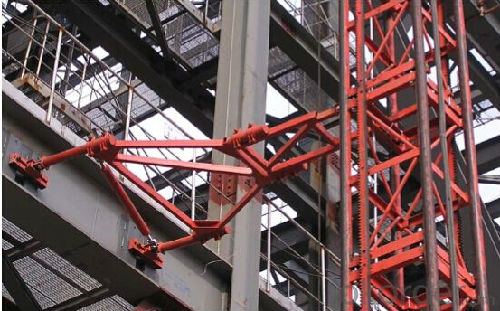
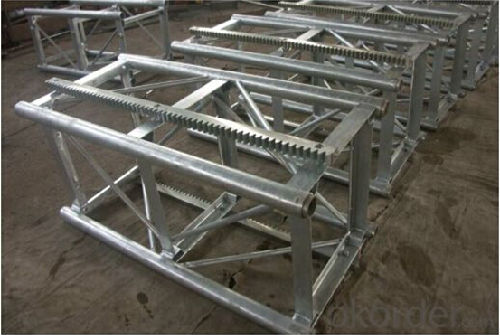
Feature:
● speed control helps eliminate the concussion during start up and braking, steady the operation process,
and ensures automated leveling.
● open loop Fcontrol; the speed control precision can reach ±2~3%. Realizes accurate low speed positioning
● current-restriction function, ensuring a small current when motor start up and reducing the . It reduces the engery consumption and mitigates effects ● during running mitigates concussion to mechanical parts, reduces wears of rack, pinion and the brake
and prolongs the spare parts'life.
● system also has the over voltage protection,low voltage protection, overcurrent, overload and anti-stalling protection functions,
Building Hoist Specifiction
FAQ of Building Hoist
Q: What is the building hoist main purpose?
A: Building hoist equipped with double or single cabin to transport the materials and labors up and down. construction equipment
Q: What is the main structure of building hoist?
A: The P/M construction hoist mainly contains metal structure, driving system, electrical control system, , electrical top crane and safety device.
Q: What is the meaning of the building hoist’s code?
A: stands for rack and pinion hoist, “ stands for double cage and capacity is 2 tons per cage. stands for single cage and capacity
Q: What is the dimension of the cage?
A: Normally the cage dimension is for type hoist. Details should be checked according to our quotation sheet. Also, the size can be customized according to the factual site condition
- Q: Is it possible to use a building hoist for lifting delicate or fragile items?
- <p>A building hoist is typically designed for heavy construction materials and not recommended for lifting fragile objects. The vibrations and force exerted during lifting can damage delicate items. For fragile objects, specialized hoists or cranes with controlled movements and gentle handling capabilities are advised to ensure safety and prevent damage.</p>
- Q: What are the requirements for the construction elevator
- Actually good or bad for safety device can only judge by test and inspection in the daily operation is not sure whether it is good or bad, for those who are serving for safety device, or advice for the earlier inspection and regular test, only accomplish know fairly well, to malignant accident prevention rather than cure.
- Q: Can a building hoist be utilized for lifting objects that exceed manual lifting capabilities?
- <p>Yes, building hoists are specifically designed to lift and transport objects that are too large or heavy for manual lifting. They are commonly used in construction to move materials and equipment to various levels of a building. Building hoists are equipped with safety features and can handle substantial weight, making them an essential tool in construction projects where heavy objects need to be moved efficiently and safely.</p>
- Q: This question asks whether it is safe to operate a building hoist in adverse weather conditions such as wind and rain.
- <p>The use of a building hoist in windy or rainy weather is generally not recommended due to safety concerns. Wind can cause instability and swaying of the hoist, while rain can lead to slippery conditions and electrical hazards. Most hoist manufacturers and safety guidelines advise against operating hoists in such conditions. However, if absolutely necessary, it should be done with extreme caution, following specific safety protocols, and ensuring all necessary weatherproofing and stability measures are in place. Always consult the manufacturer's guidelines and local regulations before operating a hoist in adverse weather.</p>
- Q: This question asks for criteria to differentiate between electric and hydraulic building hoists for selection based on specific needs.
- <p>When choosing between electric and hydraulic building hoists, consider the following: 1) Power Source: Electric hoists require a reliable electricity supply while hydraulic hoists need a power source for the hydraulic pump. 2) Lifting Capacity: Electric hoists often have higher lifting capacities. 3) Speed: Electric hoists generally offer faster lifting and lowering speeds. 4) Maintenance: Hydraulic hoists may require more frequent maintenance due to fluid changes and potential leaks. 5) Noise: Electric hoists are quieter. 6) Cost: Initial costs and operating expenses should be compared. 7) Safety: Both types have safety features, but electric hoists might offer more advanced safety options. 8) Environmental Factors: Consider weather conditions; electric hoists are less affected by rain and cold. Your choice should align with the project's specific requirements, such as the weight of materials to be lifted, frequency of use, and environmental conditions.</p>
- Q: This question asks for an explanation on how to operate an automatic control system for a building hoist.
- <p>To use an automatic control system for a building hoist, first ensure the system is properly installed and inspected. Familiarize yourself with the control panel, which typically includes buttons for up, down, stop, and emergency stop. Ensure all safety protocols are in place. Turn on the system and select the desired hoist. Use the up and down buttons to control the hoist's movement. Monitor the load and adjust the speed as needed. Always be aware of the hoist's limits and never exceed them. Regularly check the system for any faults or irregularities and address them promptly. Remember, safety is paramount when operating a building hoist.</p>
- Q: The tower crane is on a surface with the construction elevator, and only 2 or 3 meters away. Is that allowed
- Congratulations, it's a tragedy when you want to start the tower
- Q: Is it possible to substitute a hydraulic cylinder for an electric motor in a building hoist system?
- <p>A hydraulic cylinder can indeed be used as a replacement for a motor in a building hoist, but it requires a different system design. Hydraulic systems use fluid pressure to generate linear motion, which can be harnessed to lift and lower loads. They offer high power-to-weight ratios and can handle heavy loads, making them suitable for hoisting applications. However, they require a power source for the hydraulic pump, and the system must be designed to manage fluid flow, pressure, and safety features. Unlike electric motors, hydraulic systems also need regular maintenance and can be less energy-efficient. Despite these differences, with proper design and engineering, a hydraulic cylinder can effectively replace an electric motor in a hoist system.</p>
- Q: This question asks for a description of the process of using a hydraulic cylinder in the context of a building hoist.
- <p>To use a hydraulic cylinder in a building hoist, first ensure the hoist is properly installed and secured. Connect the hydraulic cylinder to the hoist's power source, typically a hydraulic pump. The pump pressurizes hydraulic fluid, which is then directed into the cylinder. As the fluid enters, it pushes a piston within the cylinder, causing it to extend and lift the load. To lower the load, the fluid is released from the cylinder, allowing the piston to retract. Always monitor the pressure and ensure the system is leak-free for safe operation. Regular maintenance, including checking seals and lubricating parts, is crucial to prolong the life of the hydraulic cylinder and ensure efficient hoist performance.</p>
- Q: This question asks for a guide on how to properly and effectively install lifting equipment to ensure safety and efficiency.
- <p>To install lifting equipment safely and efficiently, follow these steps: 1. Ensure the equipment is suitable for the load and environment. 2. Check all safety features and documentation. 3. Position the equipment on a stable, level surface. 4. Follow the manufacturer's installation guide precisely. 5. Conduct a thorough inspection before operation. 6. Train operators on safe usage. 7. Regularly maintain and inspect the equipment. Remember, safety is paramount, and adherence to guidelines is crucial to prevent accidents and ensure efficient operation.</p>
1. Manufacturer Overview
| Location | Jiangsu,China |
| Year Established | 1990 |
| Annual Output Value | Below US$1 Million |
| Main Markets | Mid East;Southeast Asia;South America |
| Company Certifications | ISO 9001:2008; |
2. Manufacturer Certificates
| a) Certification Name | |
| Range | |
| Reference | |
| Validity Period |
3. Manufacturer Capability
| a) Trade Capacity | |
| Nearest Port | SHANGHAI |
| Export Percentage | 1% - 10% |
| No.of Employees in Trade Department | 300 |
| Language Spoken: | English;Chinese |
| b) Factory Information | |
| Factory Size: | Above 300,000 square meters |
| No. of Production Lines | Above 15 |
| Contract Manufacturing | OEM Service Offered;Design Service Offered |
| Product Price Range | Average |
Send your message to us
Building Hoist SC120/120
- Loading Port:
- China Main Port
- Payment Terms:
- TT or L/C
- Min Order Qty:
- 1 Set set
- Supply Capability:
- 90 Sets Per Month set/month
OKorder Service Pledge
OKorder Financial Service
Similar products
Hot products
Hot Searches
Related keywords
